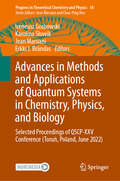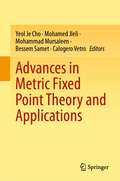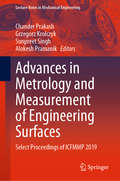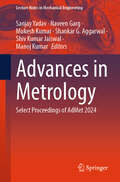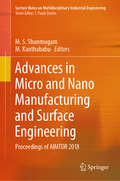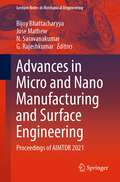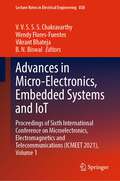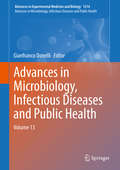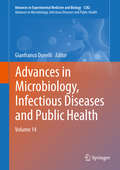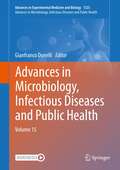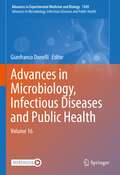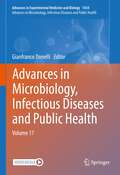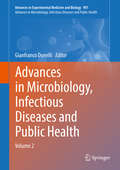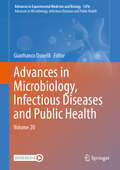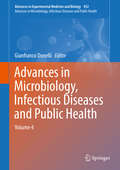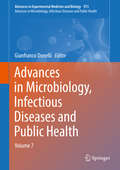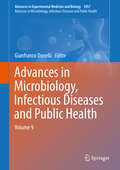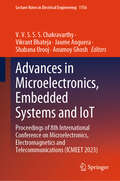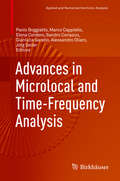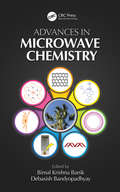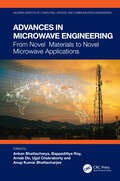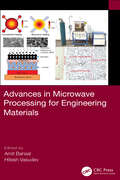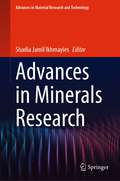- Table View
- List View
Advances in Methods and Applications of Quantum Systems in Chemistry, Physics, and Biology: Selected Proceedings of QSCP-XXV Conference (Toruń, Poland, June 2022) (Progress in Theoretical Chemistry and Physics #34)
by Jean Maruani Erkki J. Brändas Ireneusz Grabowski Karolina SłowikThis book contains peer-reviewed contributions based on talks presented at the 25th International Workshop on Quantum Systems in Chemistry, Physics, and Biology held in Toruń, Poland, in June 2022. The book reviews significant advances in concepts, methods, and applications of quantum systems in a broad variety of areas in modern chemistry, physics, and biology. In particular, it discusses atomic, molecular, and solid state structure, dynamics and spectroscopy, relativistic and correlation effects in quantum chemistry, topics of computational chemistry, physics, and biology, as well as applications of theoretical chemistry and physics in advanced molecular and nano-materials and biochemical systems. This book is aimed at advanced graduate students, academics, and researchers, both in university and corporation laboratories, interested in state of the art and novel trends in quantum chemistry, physics, and biology, and their applications.
Advances in Metric Fixed Point Theory and Applications
by Yeol Je Cho Mohammad Mursaleen Mohamed Jleli Bessem Samet Calogero VetroThis book collects papers on major topics in fixed point theory and its applications. Each chapter is accompanied by basic notions, mathematical preliminaries and proofs of the main results. The book discusses common fixed point theory, convergence theorems, split variational inclusion problems and fixed point problems for asymptotically nonexpansive semigroups; fixed point property and almost fixed point property in digital spaces, nonexpansive semigroups over CAT(κ) spaces, measures of noncompactness, integral equations, the study of fixed points that are zeros of a given function, best proximity point theory, monotone mappings in modular function spaces, fuzzy contractive mappings, ordered hyperbolic metric spaces, generalized contractions in b-metric spaces, multi-tupled fixed points, functional equations in dynamic programming and Picard operators.This book addresses the mathematical community working with methods and tools of nonlinear analysis. It also serves as a reference, source for examples and new approaches associated with fixed point theory and its applications for a wide audience including graduate students and researchers.
Advances in Metrology and Measurement of Engineering Surfaces: Select Proceedings of ICFMMP 2019 (Lecture Notes in Mechanical Engineering)
by Chander Prakash Sunpreet Singh Grzegorz Krolczyk Alokesh PramanikThis book presents the select proceedings of the International Conference on Functional Material, Manufacturing and Performances (ICFMMP) 2019. The book covers broad aspects of several topics involved in the metrology and measurement of engineering surfaces and their implementation in automotive, bio-manufacturing, chemicals, electronics, energy, construction materials, and other engineering applications. The contents focus on cutting-edge instruments, methods and standards in the field of metrology and mechanical properties of advanced materials. Given the scope of the topics, this book can be useful for students, researchers and professionals interested in the measurement of surfaces, and the applications thereof.
Advances in Metrology: Select Proceedings of AdMet 2024 (Lecture Notes in Mechanical Engineering)
by Manoj Kumar Sanjay Yadav Mukesh Kumar Naveen Garg Shankar G. Aggarwal Shiv Kumar JaiswalThis book presents the select proceedings of the 9th National Conference on Advances in Metrology (AdMet 2024). It highlights and discusses the recent technological advancements and developments in the areas of fundamental and quantum metrology, physico-mechanical and electrical metrology, time and frequency metrology, materials metrology, industrial and legal metrology, and digital metrology, gas and aerosol metrology among others. This book is aimed at those engaged in conformity assessment, quality system management, calibration, and testing in all sectors of industry as well as in academic research. The book is a valuable reference for metrologists, scientists, engineers, academicians, and students from research institutes and industrial establishments to explore future directions and research in the areas of sensors, advanced materials, measurements, and quality improvement.
Advances in Micro and Nano Manufacturing and Surface Engineering: Proceedings of AIMTDR 2018 (Lecture Notes on Multidisciplinary Industrial Engineering)
by M. S. Shunmugam M. KanthababuThis volume presents research papers on micro and nano manufacturing and surface engineering which were presented during the 7th International and 28th All India Manufacturing Technology, Design and Research conference 2018 (AIMTDR 2018). The papers discuss the latest advances in miniature manufacturing, the machining of miniature components and features as well as improvement of surface properties. This volume will be of interest to academicians, researchers, and practicing engineers alike.
Advances in Micro and Nano Manufacturing and Surface Engineering: Proceedings of AIMTDR 2021 (Lecture Notes in Mechanical Engineering)
by G. Rajeshkumar Jose Mathew Bijoy Bhattacharyya N. SaravanakumarThis book presents select proceedings of the 8th International and 29th All India Manufacturing Technology, Design, and Research Conference (AIMTDR 2021). It discusses the latest advances in miniature manufacturing, machining of miniature components, surface engineering, nanomaterials, nanotechnology, industry 4.0, optimization techniques, micro-electric discharge machining, electrochemical micro-machining, thin films, optimization of micro-machining process parameters, machining of nano-composites, characterization using atomic force microscopy, micro tool fabrications, characterization of nano-composites, surface roughness analysis, tribological performance of surface coated materials, and sustainability in manufacturing. The contents of this book are useful for students, researchers, and as well as industry professionals working in the various areas of mechanical engineering.
Advances in Micro-Electronics, Embedded Systems and IoT: Proceedings of Sixth International Conference on Microelectronics, Electromagnetics and Telecommunications (ICMEET 2021), Volume 1 (Lecture Notes in Electrical Engineering #838)
by Vikrant Bhateja Wendy Flores-Fuentes V. V. S. S. S. Chakravarthy B. N. BiswalThis book discusses the latest developments and outlines future trends in the fields of microelectronics, electromagnetics and telecommunication. It contains original research works presented at the International Conference on Microelectronics, Electromagnetics and Telecommunication (ICMEET 2021), held in Bhubaneswar, Odisha, India during 27 – 28 August 2021. The papers were written by scientists, research scholars and practitioners from leading universities, engineering colleges and R&D institutes from all over the world and share the latest breakthroughs in and promising solutions to the most important issues facing today’s society.
Advances in Microbiology, Infectious Diseases and Public Health: Volume 13 (Advances in Experimental Medicine and Biology #1214)
by Gianfranco DonelliThis book series focuses on current progress in the broad field of medical microbiology, and covers both basic and applied topics related to the study of microbes, their interactions with human and animals, and emerging issues relevant for public health. Original research and review articles present and discuss multidisciplinary findings and developments on various aspects of microbiology, infectious diseases, and their diagnosis, treatment and prevention.The book series publishes review and original research contributions, short reports as well as guest edited thematic book volumes. All contributions will be published online first and collected in book volumes. There are no publication costs.Advances in Microbiology, Infectious Diseases and Public Health is a subseries of Advances in Experimental Medicine and Biology, which has been publishing significant contributions in the field for over 30 years and is indexed in Medline, Scopus, EMBASE, BIOSIS, Biological Abstracts, CSA, Biological Sciences and Living Resources (ASFA-1), and Biological Sciences. 2018 Impact Factor: 2.126.
Advances in Microbiology, Infectious Diseases and Public Health: Volume 14 (Advances in Experimental Medicine and Biology #1282)
by Gianfranco DonelliThis book series focuses on current progress in the broad field of medical microbiology, and covers both basic and applied topics related to the study of microbes, their interactions with human and animals, and emerging issues relevant for public health. Original research and review articles present and discuss multidisciplinary findings and developments on various aspects of microbiology, infectious diseases, and their diagnosis, treatment and prevention.Advances in Microbiology, Infectious Diseases and Public Health is a subseries of Advances in Experimental Medicine and Biology, which has been publishing significant contributions in the field for over 30 years and is indexed in Medline, Scopus, EMBASE, BIOSIS, Biological Abstracts, CSA, Biological Sciences and Living Resources (ASFA-1), and Biological Sciences. 2018 Impact Factor: 2.126.
Advances in Microbiology, Infectious Diseases and Public Health: Volume 15 (Advances in Experimental Medicine and Biology #1323)
by Gianfranco DonelliThis book series focuses on current progress in the broad field of medical microbiology, and covers both basic and applied topics related to the study of microbes, their interactions with human and animals, and emerging issues relevant for public health. Original research and review articles present and discuss multidisciplinary findings and developments on various aspects of microbiology, infectious diseases, and their diagnosis, treatment and prevention.The book series publishes review and original research contributions, short reports as well as guest edited thematic book volumes. All contributions will be published online first and collected in book volumes. There are no publication costs.Advances in Microbiology, Infectious Diseases and Public Health is a subseries of Advances in Experimental Medicine and Biology, which has been publishing significant contributions in the field for over 30 years and is indexed in Medline, Scopus, EMBASE, BIOSIS, Biological Abstracts, CSA, Biological Sciences and Living Resources (ASFA-1), and Biological Sciences. 2019 Impact Factor: 2.450. 5 Year Impact Factor: 2.324; Cite Score: 3.0;Eigenfactor Score: 0.03583; Article Influence Score: 0.603
Advances in Microbiology, Infectious Diseases and Public Health: Volume 16 (Advances in Experimental Medicine and Biology #1369)
by Gianfranco DonelliThis book series focuses on current progress in the broad field of medical microbiology, and covers both basic and applied topics related to the study of microbes, their interactions with human and animals, and emerging issues relevant for public health. Original research and review articles present and discuss multidisciplinary findings and developments on various aspects of microbiology, infectious diseases, and their diagnosis, treatment and prevention.The book series publishes review and original research contributions, short reports as well as guest edited thematic book volumes. All contributions will be published online first and collected in book volumes. There are no publication costs.Advances in Microbiology, Infectious Diseases and Public Health is a subseries of Advances in Experimental Medicine and Biology, which has been publishing significant contributions in the field for over 30 years and is indexed in Medline, Scopus, EMBASE, BIOSIS, Biological Abstracts, CSA, Biological Sciences and Living Resources (ASFA-1), and Biological Sciences. 2020 Impact Factor: 2.622. 5 Year Impact Factor: 3.049; Cite Score: 3.9;Eigenfactor Score: 0.03583; Article Influence Score: 0.602
Advances in Microbiology, Infectious Diseases and Public Health: Volume 17 (Advances in Experimental Medicine and Biology #1370)
by Gianfranco DonelliThis book series focuses on current progress in the broad field of medical microbiology, and covers both basic and applied topics related to the study of microbes, their interactions with human and animals, and emerging issues relevant for public health. Original research and review articles present and discuss multidisciplinary findings and developments on various aspects of microbiology, infectious diseases, and their diagnosis, treatment and prevention. The book series publishes review and original research contributions, short reports as well as guest edited thematic book volumes. All contributions will be published online first and collected in book volumes. There are no publication costs. Advances in Microbiology, Infectious Diseases and Public Health is a subseries of Advances in Experimental Medicine and Biology, which has been publishing significant contributions in the field for over 30 years and is indexed in Medline, Scopus, EMBASE, BIOSIS, Biological Abstracts, CSA, Biological Sciences and Living Resources (ASFA-1), and Biological Sciences. 2021 Impact Factor: 3.6505 Year Impact Factor: 3.634; Cite Score: 4.7; Eigenfactor Score: 0.04133; Article Influence Score: 0.713
Advances in Microbiology, Infectious Diseases and Public Health: Volume 2 (Advances in Experimental Medicine and Biology #901)
by Gianfranco DonelliThe Series will provide microbiologists, hygienists, epidemiologists and infectious diseases specialists with well-chosen contributed volumes containing updated information in the areas of basic and applied microbiology involving relevant issues for public health, including bacterial, fungal and parasitic infections, zoonosis and anthropozoonosis, environmental and food microbiology. The increasing threat of the multidrug-resistant microorganisms and the related host immune response, the new strategies for the treatment of biofilm-based, acute and chronic microbial infections, as well as the development of new vaccines and more efficacious antimicrobial drugs to prevent and treat human and animal infections will be also reviewed in this series in the light of the most recent achievements in these fields. Special attention will be devoted to the fast diffusion worldwide of the new findings of the most advanced translational researches carried out in the different fields of microbiological sciences, with the aim to promote a prompt validation and transfer at clinical level of the most promising experimental results.
Advances in Microbiology, Infectious Diseases and Public Health: Volume 20 (Advances in Experimental Medicine and Biology #1476)
by Gianfranco DonelliThis book series focuses on current progress in the broad field of medical microbiology, and covers both basic and applied topics related to the study of microbes, their interactions with human and animals, and emerging issues relevant for public health. Original research and review articles present and discuss multidisciplinary findings and developments on various aspects of microbiology, infectious diseases, and their diagnosis, treatment and prevention. The book series publishes review and original research contributions, short reports as well as guest edited thematic book volumes. All contributions will be published online first and collected in book volumes. There are no publication costs. Advances in Microbiology, Infectious Diseases and Public Health is a subseries of Advances in Experimental Medicine and Biology, which has been publishing significant contributions in the field for over 30 years and is indexed in Medline, Scopus, EMBASE, Biological Abstracts, CSA, Biological Sciences and Living Resources (ASFA-1), and Biological Sciences. Chapter 6 is available open access under a Creative Commons Attribution 4.0 International License via link.springer.com.
Advances in Microbiology, Infectious Diseases and Public Health: Volume 4 (Advances in Experimental Medicine and Biology #932)
by Gianfranco DonelliThe Advances in Microbiology, Infectious Diseases and Public Health Series will provide microbiologists, hygienists, epidemiologists and infectious diseases specialists with well-chosen contributed volumes containing updated information in the areas of basic and applied microbiology involving relevant issues for public health, including bacterial, fungal and parasitic infections, zoonoses and anthropozoonoses, environmental and food microbiology. The increasing threat of the multidrug-resistant microorganisms and the related host immune response, the new strategies for the treatment of biofilm-based, acute and chronic microbial infections, as well as the development of new vaccines and more efficacious antimicrobial drugs to prevent and treat human and animal infections will be also reviewed in this series in the light of the most recent achievements in these fields. Special attention will be devoted to the fast diffusion worldwide of the new findings of the most advanced translational researches carried out in the different fields of microbiological sciences, with the aim to promote a prompt validation and transfer at clinical level of the most promising experimental results.
Advances in Microbiology, Infectious Diseases and Public Health: Volume 7 (Advances in Experimental Medicine and Biology #973)
by Gianfranco DonelliThe Advances in Microbiology, Infectious Diseases and Public Health Series will provide microbiologists, hygienists, epidemiologists and infectious diseases specialists with well-chosen contributed volumes containing updated information in the areas of basic and applied microbiology involving relevant issues for public health, including bacterial, fungal and parasitic infections, zoonoses and anthropozoonoses, environmental and food microbiology. The increasing threat of the multidrug-resistant microorganisms and the related host immune response, the new strategies for the treatment of biofilm-based, acute and chronic microbial infections, as well as the development of new vaccines and more efficacious antimicrobial drugs to prevent and treat human and animal infections will be also reviewed in this series in the light of the most recent achievements in these fields. Special attention will be devoted to the fast diffusion worldwide of the new findings of the most advanced translational researches carried out in the different fields of microbiological sciences, with the aim to promote a prompt validation and transfer at clinical level of the most promising experimental results.
Advances in Microbiology, Infectious Diseases and Public Health: Volume 9 (Advances In Experimental Medicine And Biology #1057)
by Gianfranco DonelliProvides state-of-the-art information about infectious diseases affecting humans and animals.<p><p> Addresses the epidemiology and pathogenesis of emerging and re-emerging microbial infections.<P> Discusses the role of vaccines in the prophylaxis of severe infectious diseases.<P> Broadens the current understanding of multidrug-resistance and host immune response.<P> Informs on the new strategies for treatment of acute and chronic microbial infections.<P> Promotes prompt validation and transfer of the most promising experimental results at the clinical level.<P> This book series focuses on current progress in the broad field of medical microbiology, and covers both basic and applied topics related to the study of microbes, their interactions with human and animals, and emerging issues relevant for public health. Original research and review articles present and discuss multidisciplinary findings and developments on various aspects of microbiology, infectious diseases, and their diagnosis, treatment and prevention.<P> Advances in Microbiology, Infectious Diseases and Public Health is a subseries of Advances in Experimental Medicine and Biology, which has been publishing significant contributions in the field for over 30 years and is indexed in Medline, Scopus, EMBASE, BIOSIS, Biological Abstracts, CSA, Biological Sciences and Living Resources (ASFA-1), and Biological Sciences. 2016 Impact Factor: 1.881.
Advances in Microelectronics, Embedded Systems and IoT: Proceedings of 8th International Conference on Microelectronics, Electromagnetics and Telecommunications (ICMEET 2023) (Lecture Notes in Electrical Engineering #1156)
by Vikrant Bhateja Jaume Anguera Shabana Urooj V. V. S. S. S. Chakravarthy Anumoy GhoshThe book discusses the latest developments and outlines future trends in the fields of microelectronics, electromagnetics, and telecommunication. It contains original research works presented at the International Conference on Microelectronics, Electromagnetics and Telecommunication (ICMEET 2023), organized by Department of Electronics and Communication Engineering, National Institute of Technology Mizoram, India, during 6–7 October 2023. The book is divided into two volumes, and it covers papers written by scientists, research scholars, and practitioners from leading universities, engineering colleges, and R&D institutes from all over the world and shares the latest breakthroughs in and promising solutions to the most important issues facing today’s society.
Advances in Microlocal and Time-Frequency Analysis (Applied and Numerical Harmonic Analysis)
by Jörg Seiler Paolo Boggiatto Elena Cordero Alessandro Oliaro Marco Cappiello Sandro Coriasco Gianluca GarelloThe present volume gathers contributions to the conference Microlocal and Time-Frequency Analysis 2018 (MLTFA18), which was held at Torino University from the 2nd to the 6th of July 2018. The event was organized in honor of Professor Luigi Rodino on the occasion of his 70th birthday. The conference’s focus and the contents of the papers reflect Luigi’s various research interests in the course of his long and extremely prolific career at Torino University.
Advances in Microscopy and Microanalysis: Liquid Cell Electron Microscopy
by Ross Frances M.The first book on the topic, with each chapter written by pioneers in the field, this essential resource details the fundamental theory, applications, and future developments of liquid cell electron microscopy. This book describes the techniques that have been developed to image liquids in both transmission and scanning electron microscopes, including general strategies for examining liquids, closed and open cell electron microscopy, experimental design, resolution, and electron beam effects. A wealth of practical guidance is provided, and applications are described in areas such as electrochemistry, corrosion and batteries, nanocrystal growth, biomineralization, biomaterials and biological processes, beam-induced processing, and fluid physics. The book also looks ahead to the future development of the technique, discussing technical advances that will enable higher resolution, analytical microscopy, and even holography of liquid samples. This is essential reading for researchers and practitioners alike.
Advances in Microwave Chemistry (New Directions in Organic & Biological Chemistry)
by Bimal K Banik Debasish BandyopadhyayAdvances in Microwave Chemistry discusses the novel bond formation methodologies, synergistic effects of microwaves with other entities, sample preparation including digestion, combustion, and extraction techniques, as well as selectivity in chemical processes. Recent updates are provided on microwave-assisted syntheses of pharmacologically significant aza-, oxo- and other heterocycles, including lactams, nucleosides, bile acids and sterols, the preparation of nanomaterials, composites, and absorber layer materials for thin film. This book also incorporates comparative discussions involving microwave irradiation with conventional methods in different aspects of organic, inorganic, medicinal, and green chemistry. Key Features: Provides a comparative discussion on microwave irradiation with conventional methods in different aspects of organic, inorganic, medicinal, and green chemistry Presents recent applications of microwave radiation in biocatalysis Offers a complete package correlating various aspects of microwaves in organic syntheses, the biological impact of products formed in reactions, pharmacological features, and environmental sustainability of the procedures Explains microwave-induced reactions on structurally complex bile acids and sterols Stands as a valuable and unique addition to the well-established book series, New Directions in Organic and Biological Chemistry
Advances in Microwave Engineering: From Novel Materials to Novel Microwave Applications (Modern Aspects of Computing, Devices, and Communication Engineering)
by Arnab De Ankan Bhattacharya Bappadittya Roy Ujjal Chakraborty Anup Kumar BhattacharjeeThis text showcases recent advancements in the field of microwave engineering, starting from the use of innovative materials to the latest microwave applications. It also highlights safety guidelines for exposure to microwave and radio frequency energy. The book provides information on measuring circuit parameters and dielectric parameters. • Explains microwave antennas, microwave communication, microwave propagation, microwave devices, and circuits in detail • Covers microwave measurement techniques, radiation hazards, space communication, and safety measures • Focuses on advanced computing technologies, wireless communication, and fiber optics • Presents scattering matrix and microwave passive components and devices such as phase shifters and power dividers • Showcases the importance of space communication, radio astronomy, microwave material processing, and advanced computing technologies The text provides a comprehensive study of the foundations of microwave heating and its interactions with materials for various applications. It also addresses applications of microwave devices and technologies in diverse areas, including computational electromagnetics, remote sensing, transmission lines, radiation hazards, and safety measures. It emphasizes the impact of resonances on microwave power absorption and the effect of nonuniformity on heating rates. The text is primarily written for senior undergraduate students, graduate students, and academic researchers in the fields of electrical engineering, electronics and communication engineering, computer engineering, and materials science.
Advances in Microwave Processing for Engineering Materials
by Hitesh Vasudev Amit BansalThis text discusses recent research techniques in the field of microwave processing of engineering materials by utilizing microwave radiation in the form of microwave hybrid heating (MHH). It is useful for industrial and household applications including the joining of materials, casting of bulk metal alloy material, drilling of borosilicate glass materials, development of cladding of different materials for friction, wear, and corrosion. The book: Discusses the development of high-temperature resistant materials using microwave processing Covers the latest research development in microwave processing in the field of healthcare i.e. bio-medical implants Highlights concepts of microwave heating in joining, cladding, and casting of metallic materials Explains mechanisms of failure of materials and protection in a comprehensive manner Provide readers the knowledge of microwave processing of materials in major thrust areas of engineering applications This book extensively highlights the latest advances in the field of microwave processing for engineering materials. It will serve as an ideal reference text for graduate students and academic researchers in the fields of materials science, manufacturing engineering, industrial engineering, mechanical engineering, and production engineering.
Advances in Mineral Resources, Geotechnology and Geological Exploration: Proceedings of the 7th International Conference on Mineral Resources, Geotechnology and Geological Exploration (MRGGE 2022), Xining, China, 18-20 March, 2022
by Junwen Zhang Rashid, Ahmad Safuan Bin AAdvances in Mineral Resources, Geotechnology and Geological Exploration focuses on the research of mineral resources, geotechnology and geological exploration. The proceedings features the most cutting-edge research directions and achievements related to geology. Subjects in this proceedings include: · Materials of geography · Resource exploration · Geotechnical engineering · Rock mechanics and rock engineering The works of this proceedings can promote development of geology, resource sharing, flexibility and high efficiency. Thereby, promote scientific information interchange between scholars from top universities, research centers and high-tech enterprises working all around the world.
Advances in Minerals Research (Advances in Material Research and Technology)
by Shadia Jamil IkhmayiesThis book offers background material, reviews, and researched findings into the realms of minerals, mining, metallurgy, and engineering. Firstly, it elucidates fundamental mineral concepts, mining techniques, and mineral processing methods; secondly, it unveils cutting-edge insights on fine and coarse particle flotation, unveiling breakthrough technologies for enhanced efficiency; and thirdly, it explores the innovative applications of ultrasound and thermoluminescence in mineral processing, offering a holistic view of the latest advancements. This book sheds light on the versatile uses of silicones, the intricacies of bentonite clay, and the production pathways, properties, and applications of hydroxyapatite. Furthermore, the book provides invaluable insights into biomimetic biomineralization, the synthesis of low-carbon bio-cements, and the pioneering strides in mineral-based phase change materials.
